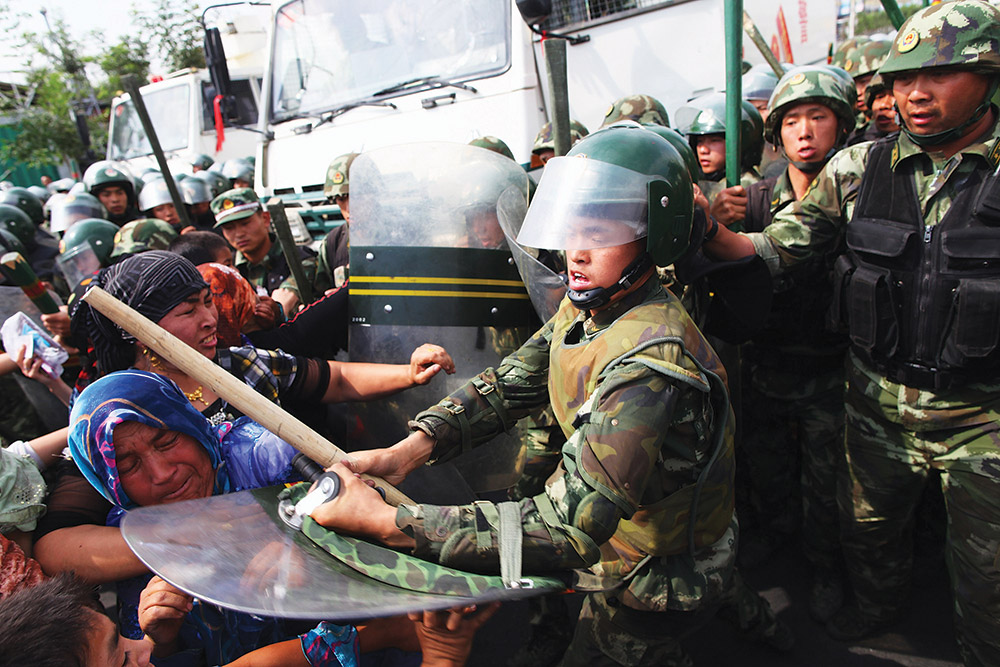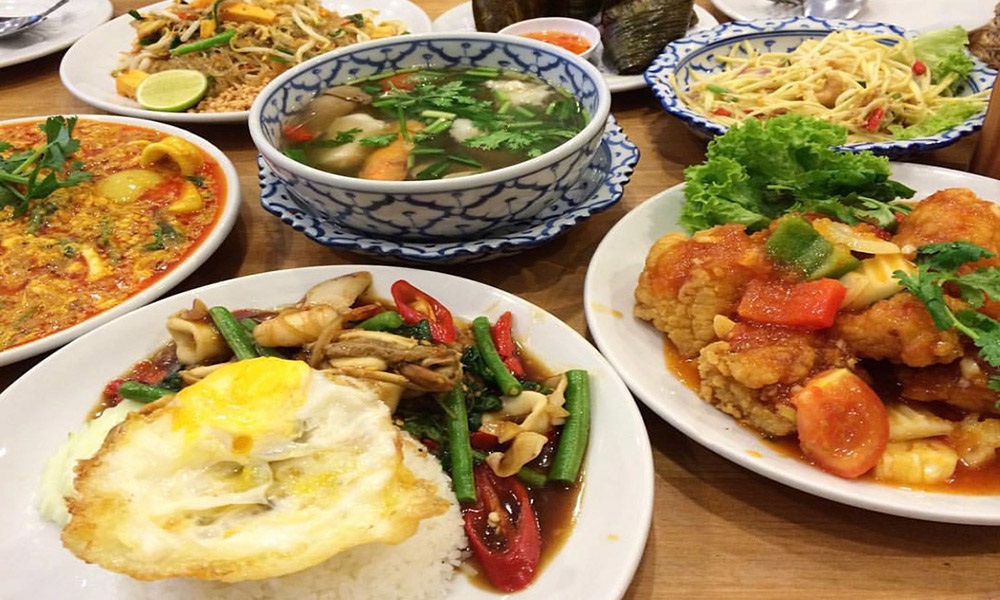By Jocelyn Neo
In Part 2 of this series, we revealed the many restrictions placed on the Uyghurs in Xinjiang after 1949, which include travel curbs, mysterious disappearances of Uyghurs returning from overseas, and banning the use of Uyghur language in schools.
This issue explores worse rights violations from illicit nuclear tests in Xinjiang to suspected organ harvesting.
Deformities From Nuclear Tests
In recent years, North Korea’s nuclear weapons have been the talk of the town. But do you know that the Chinese regime had actually carried out 46 surface nuclear tests from 1964 to 1996, causing 750,000 civilian deaths in the surrounding area?
At the ‘Chinese Nuclear Test Disasters on the Silk Road and the Japanese Role’ symposium in 2009, Dr Takada Jun, a professor at the Sapporo Medical University and a representative of the Japanese Radiation Protection Information Centre, spoke of the problems that arose from the nuclear tests.
Chinese nuclear tests began on October 16, 1964, with the above ground detonation of a 20,000-ton bomb, followed by two-megaton surface explosions in 1967. The largest was a four-megaton explosion on November 17, 1976. China changed to doing atmospheric tests in 1980 and underground tests from 1982 to 1996.
Dr Takada said that the 46 nuclear tests were carried out at the Lop Nur site in northwestern Xinjiang Province, home of the Uyghur people. The tests had a cumulative yield of over 200 megatons. Though the area of the tests is sparsely populated, many cities on the ancient Silk Road trade route are downwind from Lop Nor and have been exposed to much nuclear fallout from the variety of tests conducted. Prior to 1981, the fallout from surface tests was a major contributor to an increase in the incidences of cancer and birth defects.
The nuclear fallout from the test allegedly caused an estimated 190,000 deaths, with 1.29 million people suffering from radiation poisoning within an area 136 times the size of Tokyo.
The professor also said that the largest surface detonation was a four-megaton thermonuclear bomb, which was 10 times more powerful than the former Soviet Union’s large-scale tests. The fallout from the test allegedly caused an estimated 190,000 deaths, with 1.29 million people suffering from radiation poisoning within an area 136 times the size of Tokyo. According to an inside source, 750,000 people allegedly died as a result.
He added that China is the only country in the world that carries out these large-scale surface tests in living areas. The effects of the nuclear tests were documented in ‘Death On the Silk Road’ by British Channel 4 in July and August 1998.
A team of doctors and filmmakers posed as tourists in order to assess the possible effects from the nuclear tests in China. From the interviews conducted in local villages, they found a large number of infants with cleft lips or mental retardation. Among the Uyghur people, many were suffering from malignant lymphoid leukaemia. Incidences of cancer in Uyghur began rising in 1970 and by 1990, it was more than 30% higher than the national average. The cancer incidence in the capital city Urumqi doubled that of other areas during 1993 to 2000.
The experience of Professor Tamio Kaneko, a historian who visited the Xinjiang area, also supports the story. An expert in Asian history, Kaneko filled his house with ancient relics from central Asia. But he did not dare bring back pebble samples in Lop Nur because they have hundreds or thousands of times more radiation than regular samples.
Kaneko recalled that while he was at the research site, his eyes watered profusely and bled slightly. He also suffered from a sore throat and frequent nose bleeds. His tears would not stop in the spring because of the pollen, a residual effect of the radiation.
Mr Dili Anwar, an Uyghur exile living in England, said, “China conducts nuclear tests not only for itself, but also provides the testing site to Pakistan. We all know that Pakistan conducted a nuclear test one week after India’s test. In fact, Pakistan had already tested twice in China before that.”
Detained and Tortured
In April 2018, US State Department diplomat Laura Stone, who is the Acting Deputy Assistant Secretary for East Asian and Pacific Affairs, told reporters in Beijing that tens of thousands of people in the Xinjiang region have been detained in political re-education centres.
“We are troubled by the Chinese efforts to clamp down on the legitimate rights of Uighurs and other Muslims in Xinjiang,” she said. “We will continue to raise our concerns with the Chinese government and call for legitimate due process in the detention of its citizens.”
In January, RFA reported that more than 120,000 people were held in re-education centres in Kashgar city of southern Xinjiang.
The Chinese regime controls the Uyghurs’ culture and their right to travel freely, and there are reports that those who are too religious or hold “incorrect” political views have been detained.
“Every household, every family had three or four people taken away,” said Omer Kanat, executive committee chairman of the World Uyghur Congress, an umbrella group for the Uyghur diaspora, according to CNN.
“In some villages, you can’t see men on the streets anymore—only women and children—all the men have been sent to the camps.”
After entering these camps, what awaits the Uyghurs?
Maya Wang, a Human Rights Watch campaigner who wrote a report on the camps, said the authorities claimed that the centres were for combating separatism and terrorism. However, the camps were actually used to brainwash the Uyghurs.
“At the political education facilities, they sing patriotic songs. They learn about Xi Jinping thought. These are patriotic measures aimed at making Uighurs love the Chinese government,” she said. “It’s extreme repression and yet completely silent.”
The president of the World Uyghur Congress has also raised concerns that the Chinese regime may be targeting Uyghurs for organ harvesting and trafficking.
GUANG
Wang wrote in her report that the detainees have to “renounce their ethnic and religious identities”, a claim that one 42-year-old Kazakh Muslim confirmed separately to AP after his release from the camp.
Omir Bekali, a Kazakhstan citizen who had crossed the Chinese border for a work trip, was arrested by China’s security agencies and detained for eight months in 2017 without recourse. Two Kazakh diplomats confirmed that he was indeed held for seven months and sent to the camp.
Inside the camp, Bekali and other detainees had to renounce their Islamic beliefs while praising the Party.
Bekali recalled that when he refused to follow the orders every day, he was forced to stand at a wall for five hours at a time, a common torture method that Falun Gong practitioners also experienced while detained for their belief.
He was sent to solitary confinement a week later where he was deprived of food for 24 hours.
Bekali was later sent to Karamay’s Baijiantan District public security office where he was interrogated, tied to a “tiger chair”, and hung by his wrists against a wall with his feet just touching the ground. These methods were also commonly used on Falun Gong practitioners who refused to renounce their belief.

After 20 days in the camp, he thought about committing suicide.
“The psychological pressure is enormous, when you have to criticise yourself, denounce your thinking — your own ethnic group,” Bekali broke down in tears while recounting his experience.
“I still think about it every night, until the sun rises. I can’t sleep,” he said. “The thoughts are with me all the time.”
Bekali also recalled how he had to receive political indoctrination at another facility after his release from jail.
Every morning, Bekali and other detainees had to sing the Chinese anthem and learn ‘red songs’ like ‘Without the Communist Party, there is no New China’. They also had to study the Chinese language and Chinese history, where they were brainwashed with information that the Xinjiang people were “liberated” by the CCP in the 1950s.
Before their meals, they had to chant: “Thank the Party! Thank the Motherland! Thank President Xi!”
However, Bekali said the worst part of it all was self-criticism and repetitively chanting: “We will oppose extremism, we will oppose separatism, we will oppose terrorism.”
For self-criticism, Bekali and the detainees had to stand up one by one in front of everyone to criticise their religious history.
He recalled one detainee saying: “I travelled outside China without knowing that I could be exposed to extremist thoughts abroad. Now I know.”
Apart from being subjected to torture at the camps, the detainees could also become victims of forced organ harvesting, said an independent researcher, Ethan Gutmann.
In recent years, Epoch Times has reported news of Falun Gong practitioners who were arrested and detained, having their organ harvested.
While being held in prison or detention, Falun Gong prisoners are often subjected to systematic blood checks, for the purpose of checking their compatibility for organ transplant surgery, according to ‘Bloody Harvest’, a comprehensive investigative report by human rights lawyer David Matas and former Canadian Secretary of State (Asia-Pacific) David Kilgour.
Though Gutmann said to RFA in 2013 that it was “indisputable” that the majority of victims were Falun Gong prisoners, Uyghurs are also victims.
“Personally I estimate 65,000 of them [Falun Gong members] went under the knife—and there’s nothing surprising about those numbers as Falun Gong comprised fully 70 million people at its height in 1999,” he said.
“How many Uyghurs were harvested? Hard to answer, and although it may be high in a per-capita sense, it will always be much smaller than Falun Gong in absolute numbers.”
On December 13, 2017, Dolkun Isa, president of the World Uyghur Congress, has also raised concerns that the Chinese regime may be targeting Uyghurs for organ harvesting and trafficking.
“We are also deeply disturbed by reports of the Chinese authorities collecting blood samples from the Uyghur population in East Turkestan,” said Isa at a roundtable discussion on organ harvesting in China, according to the World Uyghur Congress website.
Human Rights Watch reported on the same day that Chinese authorities in Xinjiang had begun collecting DNA samples, fingerprints, iris scans, and blood samples from local residents between the ages of 12 and 65, under the guise of a public health programme.
“On the one hand, collecting blood samples allows the Chinese government to establish a genetic database of the Uyghur people to further monitor, control, and repress them,” Isa said.
“This genetic information also facilitates organ harvesting, making it easier to compare blood types and compatibility of potential Uyghur victims.”
Isa’s warning comes two months after the Chinese regime’s mouthpiece China News Service revealed that China Southern Airlines had opened an express lane in May 2016 for transporting human organs to and from Xinjiang for use in transplant surgery.
To be continued in the next issue.
















